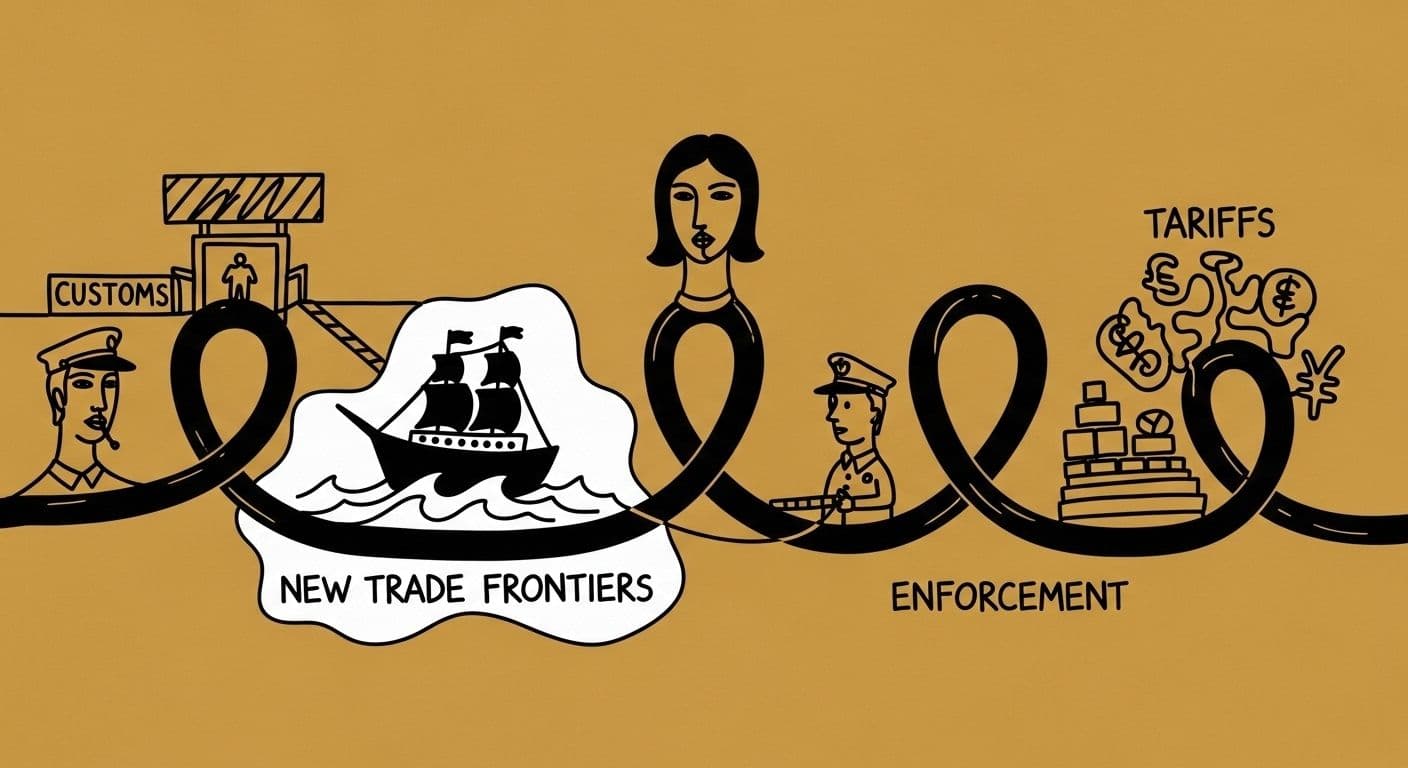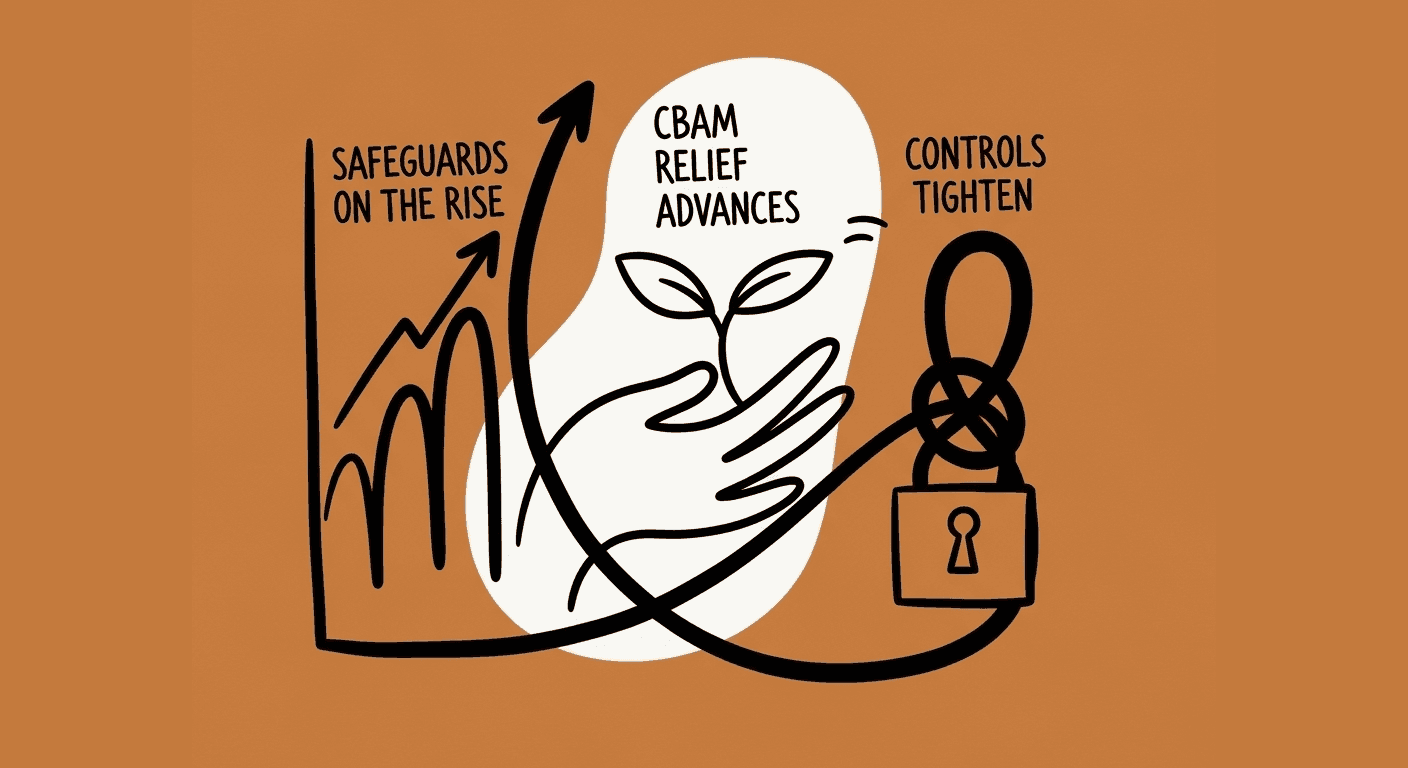
Trade Compliance Heat Wave: DOJ Task Force Returns, Transshipment Crackdown, Chip Controls, and Tariff Tests
NEWSLETTER | Trade Insight AI
DOJ Revives Trade Fraud Task Force, Targets Tariff Evasion, Smuggling
STR Trade Report • September 5, 2025
The Department of Justice has revitalized an interagency Trade Fraud Task Force to aggressively pursue tariff evasion and smuggling, focusing on AD/CVD, Section 301 and other duty programs (including Section 232 and IEEPA-related measures), using Tariff Act penalties, False Claims Act actions, and parallel criminal prosecutions in coordination with CBP and HSI. Recent civil settlements across products like multilayer wood flooring, plastic resin, extruded aluminum, and quartz surfaces signal heightened risk; expect more referrals from domestic industries and stepped-up enforcement affecting origin, classification, and valuation compliance.
Enforcement and Evasion Risks
CBP Flags Transshipment Evasion; Targeting, Audits, EAPA Actions Escalate
STR Trade Report •September 4, 2025
CBP issued a CTPAT alert warning of rising illegal transshipment to evade duties, highlighting red flags such as lack of substantial transformation, illogical routing through low-cost/FTA hubs, and mismatched origin labeling—especially in steel/aluminum, textiles/apparel, autos/parts, electronics, solar, and agriculture. The alert endorses BIS best practices (rigorous KYC, compliant forwarders, limiting routed exports for dual-use, and stronger IT-enabled screening) and says CBP is intensifying targeting, supply chain audits, and EAPA investigations, with penalties ranging from fines and seizures to CTPAT suspension and criminal exposure. With the administration signaling a possible 40% tariff on goods deemed transshipped under preliminary trade deals, importers face heightened risk and should thoroughly document origin/substantial transformation and scrutinize preferential claims.
OFAC Fines U.S. Freight Forwarder $1.6M for Sanctions Violations
STR Trade Report •September 5, 2025
OFAC reached a $1.6 million settlement with a U.S.-based international freight forwarder that contracted with a blocked Venezuelan state airline to ship goods from Mexico to Argentina on a separately blocked aircraft operated by an Iranian company, after failing to conduct sanctions screening in line with its own policies. Though the base penalty was the statutory maximum $2.15 million, OFAC credited cooperation and remediation (contract template changes, added compliance staff, enhanced auditing) while citing aggravating factors including no voluntary self-disclosure and reckless disregard—signaling to logistics providers that urgent commercial needs cannot override counterparty due diligence.
FDA Expands Import Alerts Covering Seafood, Cheese, Cosmetics, Devices
STR Trade Report •September 4, 2025
The FDA issued or revised import alerts spanning seafood, dairy, produce, cosmetics, electronics, and medical devices—including anchovies and oysters (Korea), shrimp (Indonesia and India), tilapia and lipstick (China), cheese (eight countries), olives (Greece), cowpeas (Türkiye), rambutan (Mexico), grape juice (Brazil), laser light show projectors (China), and medical devices/instruments (Germany, Pakistan). Red‑listed items face detention without physical examination; importers should confirm supplier listing status, prepare supporting evidence or testing to demonstrate compliance, and plan for potential delays or refusal if issues aren’t resolved.
Trade Remedies and Tariff Litigation
Federal Circuit Again Strikes IEEPA Tariffs, But Collections Continue
STR Trade Report •September 3, 2025
In a 7-4 decision on Aug. 29, the Federal Circuit affirmed the CIT’s finding that this year’s IEEPA ‘reciprocal’ and trafficking-related tariffs exceed the statute’s delegated authority, while signaling skepticism that IEEPA’s power to ‘regulate’ includes imposing tariffs at all. Citing a recent Supreme Court ruling on nationwide injunctions, the court vacated the CIT’s universal injunction and remanded for narrower consideration, but stayed that remand until Oct. 14 to allow possible Supreme Court review; CBP will continue collecting the tariffs during litigation. Importers should preserve refund rights by monitoring liquidation, seeking extensions, and protesting liquidated entries.
AD/CVD Update: Fencing Clarified; Dutch HRC 5.67%; Solar, Sunset Reviews
STR Trade Report •September 5, 2025
Commerce corrected its preliminary dumping determination on temporary steel fencing from China to clarify that critical circumstances do not exist for separate‑rate firms (avoiding retroactive duties), set a 5.67% preliminary margin in the Dutch hot‑rolled steel review (POR Oct 1, 2023–Sept 30, 2024), and concluded in a sunset review that revoking the Türkiye quartz order would likely see dumping up to 5.17%. The ITC issued preliminary affirmative injury findings in the AD/CVD cases on solar cells from India, Indonesia, and Laos, and Commerce opened sunset reviews on kitchen appliance shelving and racks (China) and rebar from Mexico (AD) and Türkiye (CVD), keeping duty exposure in play across these product lines.
USITC Keeps AD/CVD Orders on Hot-Rolled Steel from Six Nations
USITC News Releases •September 3, 2025
The USITC voted to maintain existing antidumping orders on hot-rolled steel from China, India, Indonesia, Taiwan, Thailand, and Ukraine, and countervailing duty orders on India, Indonesia, and Thailand, finding that revocation would likely lead to renewed material injury in its five-year sunset review. The orders remain in force, meaning importers should continue to account for existing duty liabilities in sourcing and pricing; the Commission’s public report is expected by October 3, 2025.
USITC Injury Finding Triggers AD/CVD Orders on Chinese Sol Gel Abrasives
USITC News Releases •September 3, 2025
On Sept. 3, 2025, the USITC found U.S. producers materially injured by Chinese imports of sol gel alumina-based ceramic abrasive grains, following Commerce findings of dumping and subsidies. Commerce will now issue antidumping and countervailing duty orders, imposing cash deposits and heightened duty exposure on importers; one commissioner supported a threat finding, but the overall vote was affirmative. Manufacturers using industrial abrasives should anticipate cost and sourcing impacts; the Commission’s public report is due by Oct. 17, 2025.
USITC Injury Finding Triggers Antidumping Order on Sri Lankan File Folders
USITC News Releases •September 3, 2025
The USITC found that U.S. producers are materially injured by paper file folder imports from Sri Lanka sold at less than fair value, paving the way for Commerce to issue an antidumping duty order. Importers should anticipate new cash deposit requirements and higher landed costs once the order publishes; the Commission’s public report will be available by October 16, 2025.
Tech Controls and Border Modernization
BIS Removes Three China VEUs, Tightens Licensing for Chipmaking Exports
STR Trade Report •September 4, 2025
The U.S. BIS issued a final rule effective Dec. 31 removing three China-based validated end users, forcing suppliers to obtain licenses for U.S.-origin goods, software, and technology used in semiconductor manufacturing. BIS expects about 1,000 additional license applications annually and indicates it will approve licenses to maintain current fab operations in China but deny those enabling capacity expansion or technology upgrades; press reports suggest a fourth removal may follow.
CBP sets fall ACE rollouts: manifest rejections, GBI, refunds, pilots
STR Trade Report •September 5, 2025
CBP updated its ACE deployment schedule for September–October, adding automated rejections for insufficient cargo/consignee/shipper data (Sept 27), a 10‑digit bond amount field (Sept 25), drawback guardrails for HTSUS Chapter 99 (Sept 16), ACH refund enablement via bank info in the portal (Sept 30), and expanded Global Business Identifier enrollment in October. Other changes include September migration to ACE Collections with new pay.gov options, disabling DIS Form 1302A for outward vessels on Oct 1, an Oct 4 pilot using decentralized identifiers/verifiable credentials for crude oil tracking, and a multi-HTS duty calculation enhancement pushed to January. Several items remain delayed or on hold—truck EEM portal (TBD), export-manifest messaging to July 2026, de minimis Entry Type 86 validations, and sanctions data capture for Russian diamonds/seafood—so filers should update systems and data quality to avoid rejections and missed refunds.
FWS moves DPEP applications online, streamlining wildlife trade routing
STR Trade Report •September 5, 2025
As of Sept. 2, the U.S. Fish and Wildlife Service launched an optional electronic application to apply for, renew, or amend Designated Port Exception Permits, which allow wildlife shipments to move through non-designated ports in limited circumstances (scientific use, preventing deterioration/loss, or undue economic hardship). The e-permit system replaces paper forms with online status tracking, electronic fee payment, and the ability to copy prior applications, potentially reducing processing time and improving planning for importers and exporters handling wildlife and wildlife products.
Global Trade Policy and Market Access
Global Tariff Crosscurrents: EU Auto Relief, Brazil Retaliation, India Standoff
STR Trade Report •September 4, 2025
The EU moved to implement its deal with Washington, proposing tariff cuts that unlock retroactive U.S. relief for EU autos from August 1. U.S. companies largely plan to stay in China despite tariffs, with 40% reorienting supply chains and only about 20% considering reshoring to the U.S. Meanwhile, Brazil readies potential countermeasures within 210 days after new 50% U.S. tariffs, and U.S.-India tensions persist amid maintained duties and Modi’s overtures to Russia and China—heightening the need for diversification and scenario planning.
USTR Greer reaffirms tariff-first strategy, says deals cover 40% of trade
USTR Press Releases •September 2, 2025
At the National Conservatism Conference, U.S. Trade Representative Jamieson Greer said the administration is reducing spending, imposing tariffs, and striking deals to address the U.S. trade deficit, stating agreements now cover 40% of U.S. trade. The remarks signal continued reliance on tariffs and partner-specific negotiations—trade professionals should expect sustained protectionist measures and deficit-driven demands in upcoming talks.
USTR Hearing Probes Brazil on Digital Trade, Tariffs, Deforestation
USTR Press Releases •September 1, 2025
USTR will hold a public hearing on September 3 at the USITC in Washington, D.C., as part of a Section 301 investigation into Brazil’s policies on digital trade and e‑payments, preferential tariffs, anti‑corruption enforcement, IP protection, ethanol market access, and illegal deforestation. The on‑the‑record hearing will not be livestreamed; a transcript will be posted afterward. The broad scope signals potential trade actions that could affect digital services, payments, and agricultural flows between the U.S. and Brazil, warranting close monitoring by exposed sectors.
Australia invests AUD 4 million in STDF to boost SPS capacity
WTO Latest News •September 3, 2025
Australia will provide AUD 4 million (about CHF 2.1 million) to the WTO-housed Standards and Trade Development Facility to implement its 2025–2030 strategy, strengthening sanitary and phytosanitary systems in developing and least-developed countries to facilitate safe agricultural trade and market access. The funding builds on long-term support (CHF 21,284,200 to WTO trust funds, including CHF 4,230,383 to STDF) and will back projects such as Pacific apiculture upgrades and scalable food-safety audit and inspection pilots. For traders, enhanced SPS compliance can reduce border rejections and disruptions while opening new sourcing and export opportunities; eligible partners are encouraged to apply for STDF project grants.
Related News

August 11, 2025
Tariffs, Enforcement, and New Trade Frontiers: Key Developments Shaping Global Trade
Read more →
September 19, 2025
Safeguards on the Rise, CBAM Relief Advances, and Controls Tighten
Read more →
October 3, 2025